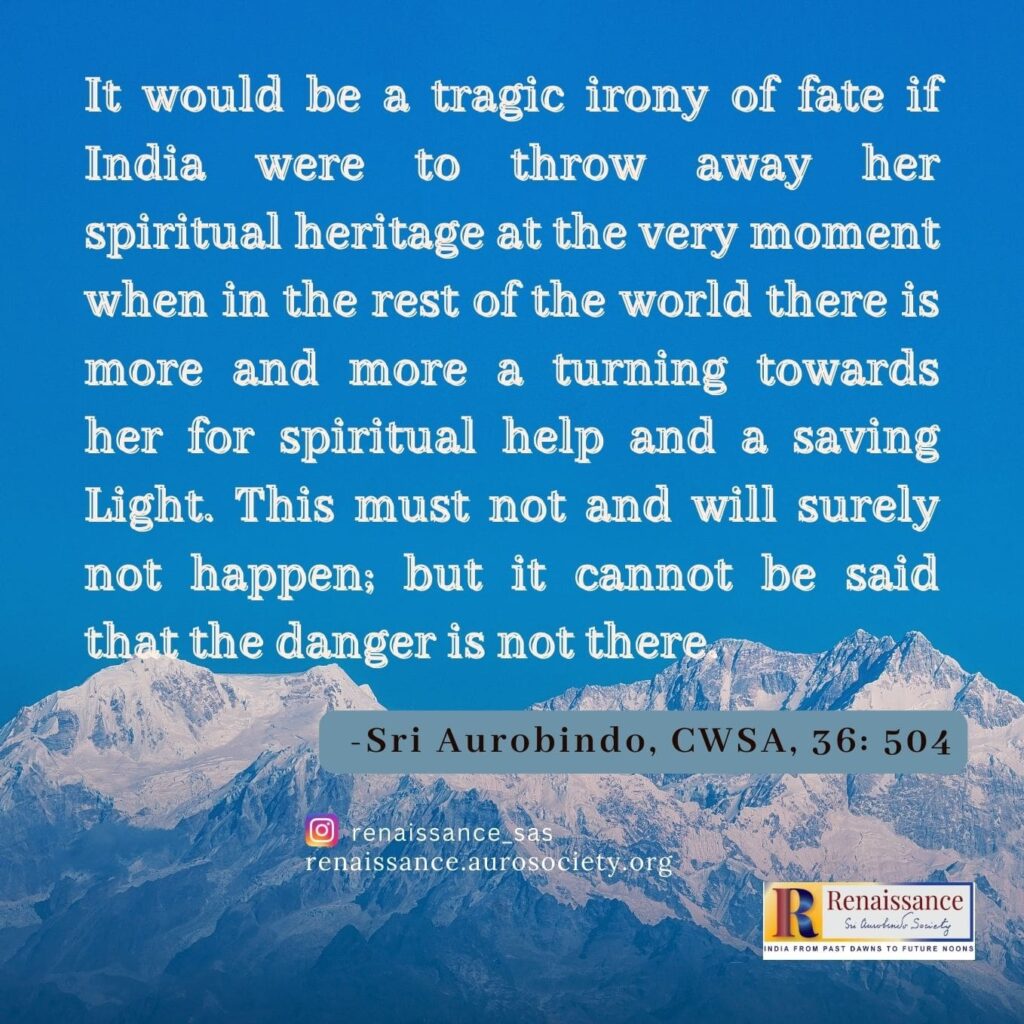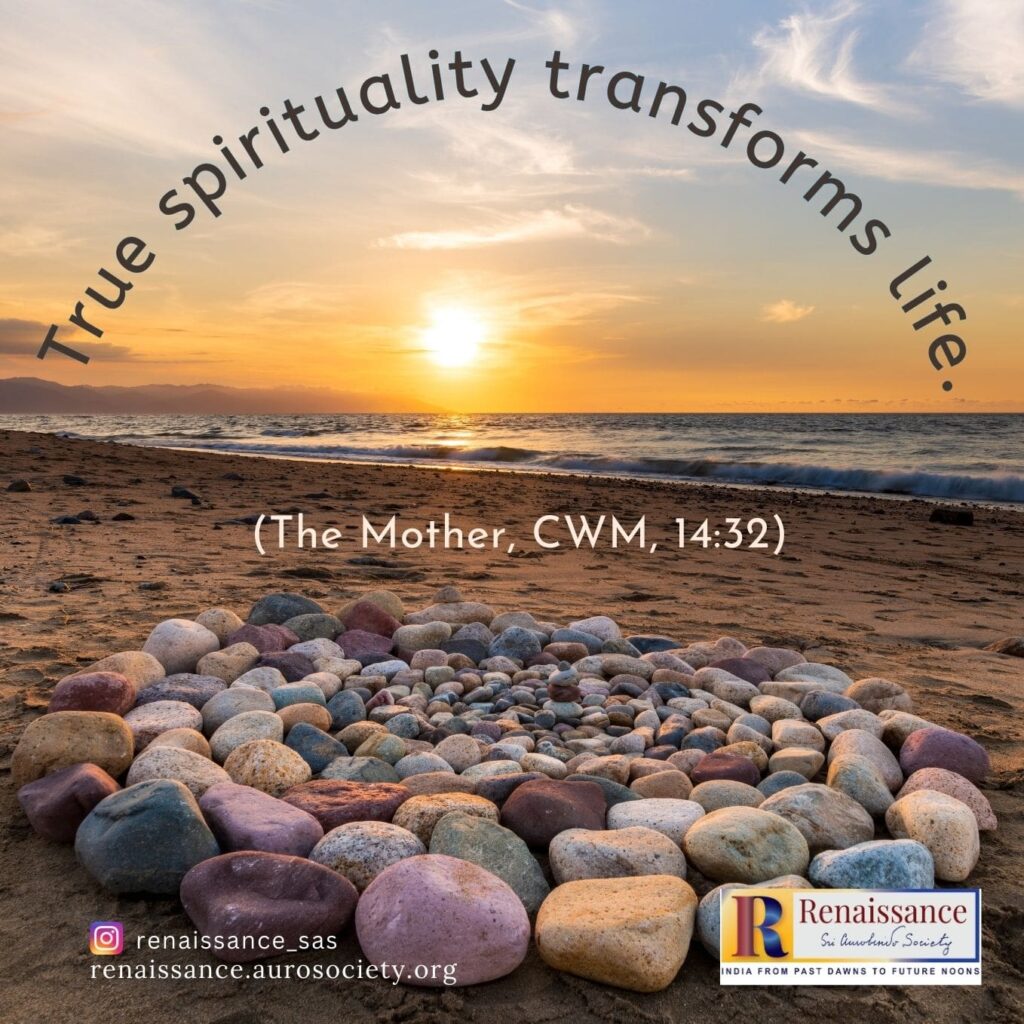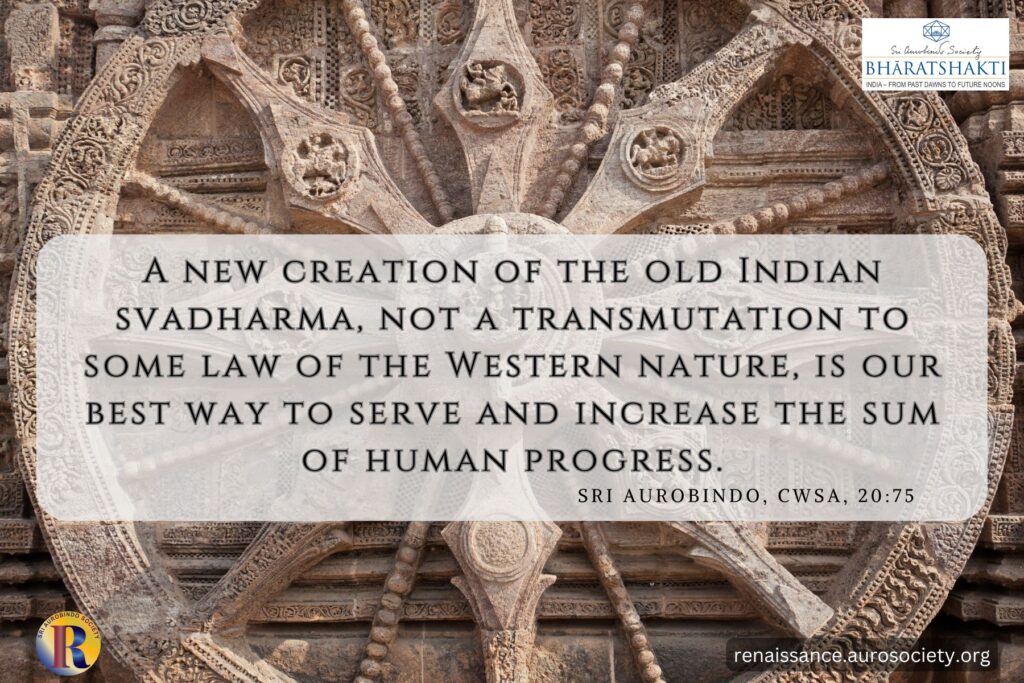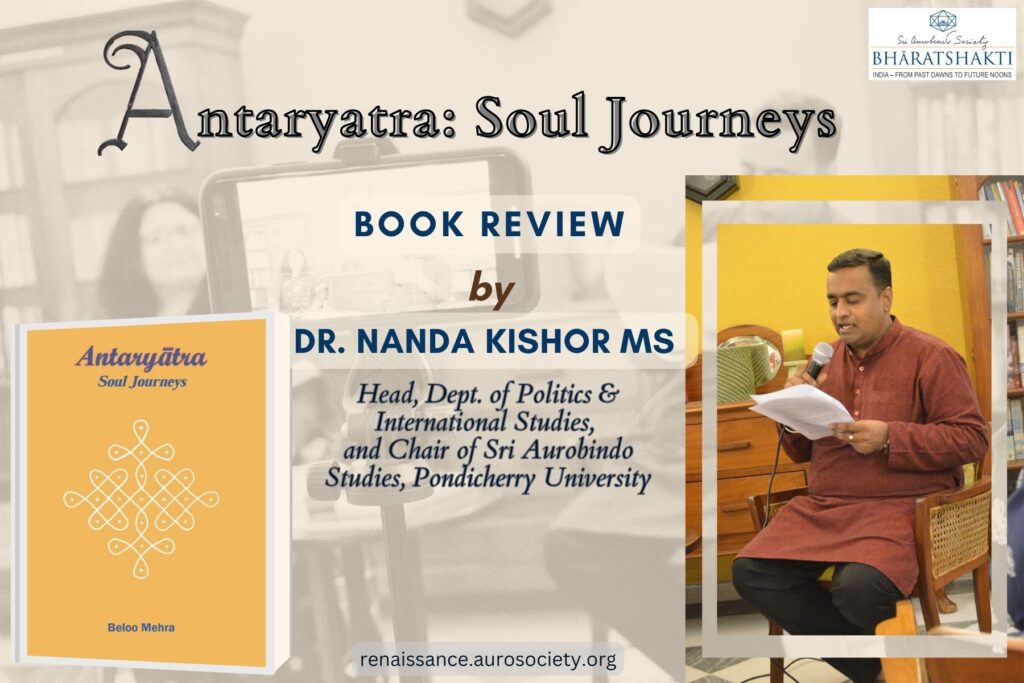Editor’s note: “The poet of patriotism, the prophet of nationalism and the lover of humanity” – these were the famous words used by C. R. Das, Sri Aurobindo’s advocate, friend and follower who stood for him before the bar of History for his cause, and not merely before a British Court of Justice. To these three, another epithet has been added to further complete the description of Sri Aurobindo – bringer of the Life Divine.
Though there are many more ways left to speak of the integral personality of Sri Aurobindo, the Mahayogi of modern age, this article highlights the visionary aspect of this Rishi of our times who saw and spoke clearly of the future march India and world must take if a divine life on earth has to become a reality.
Sri Aurobido once wrote that man approaches nearer his perfection when he combines in himself the idealist and the pragmatist, the originative soul and the executive power. But what humanity needs most in its onward march is the seer who is able to execute his vision. Such a seer, a rishi takes his stand in the Purusha, the Knower who controls executive force, and he possesses the power that he uses. He draws nearer to the type of the divine Seer-Will that has created and that governs the universe.
This article reminds us of both the seer-vision and the divine force with which Sri Aurobindo, the Rishi of our times, has shown the path for the future march of India and the world.
This article is based on a talk given by the author at Sri Aurobindo Society on July 24, 2023. For a picture gallery from the event click HERE.
Watch the Recording of the Talk

The term ‘future’ occupies a pivotal place in Sri Aurobindo’s life and work, his philosophy and world-view, right from the ‘Bande Mataram’ period to his 15th August 1947 Independence Day message. He famously said, “we do not belong to past dawns, but to the noons of the future.” (CWSA, Vol. 19, p. 10)
We long for the past with a sense of nostalgia; the past is often glorified and idealized as an antidote to the ills and predicament of the present. However, Sri Aurobindo declared that achievements of the past, important as they are, must lead to a greater future. Indeed, an obsession with the past and the desire to recover the ‘lost glory’ of nations/civilizations, has led to catastrophic consequences in the modern world, as mankind has learnt the hard way especially during World War II.
Sri Aurobindo in The Human Cycle makes a vital distinction between ‘true’ and ‘false’ subjectivism, namely and group souls and group egos. Blurring of the two categories has led to devastating conflicts among warring nations.
***

Critics have made a distinction between Baroda, Bengal, and Pondicherry phase in Sri Aurobindo’s life: He spent thirteen years in Baroda, four years in Bengal and the last forty at Pondicherry. He had four years of active political life, but did not give up the ‘political’ in the widest sense after leaving Bengal. If by ‘politics’ we understand the power and ability to transform the world; Sri Aurobindo evinced a keen interest in the ‘political,’ throughout his career.
There appear to be a break between the three periods in terms of his realizations, and yet there is an underlying continuity as well. From seeking the meaning of India and Hinduism, his journey takes him to seeking the redemption of mankind in the Life Divine and Savitri. We see this in his socio- political and international vision as well.
As a mystic and visionary thinker, he saw possibilities for India and mankind–opportunities that could be used if we were to cooperate with the Time Spirit, heed her warnings and collaborate with the larger forces for change. There is a freedom to grow and freedom to lapse back into ignorance in human affairs. Mankind must make the choice. As the Mother said: “The world is preparing for a big change, will you help?” (CWM, Vol. 15, p. 175)

***
In a sense, the achievements of the 20th Century seem to have been defeated, in large measure, in the first part of the 21st Century. Ethnic rivalry, divisive, polarized thinking, armed conflicts, widespread violence, malnutrition, disease and hunger, war in Ukraine, political and military expansionism punctuate the national and international landscape today.
For Sri Aurobindo, the future of India, its unity and integrity go hand in hand with the future of the world.
As he advances in yoga and spiritual realizations, his views on politics, society, the nation- state, and humanity undergo corresponding changes, radical in nature. He is guided by an inner call and inner voice. His experience in the Alipore Jail, journey to Chandernagore and Pondicherry, refusal to leave for safe heavens like Algeria are evidence of the fact. His messages to Joseph Baptista (CWSA, Vol. 36, p. 254) and B.S. Moonje (CWSA, Vol. 36, p. 257) regarding their invitation to lead the Congress Party in 1920, and his refusal to do so, are to be seen in the same light.
Sri Aurobindo’s stand regarding the Quit India Movement in 1942, support for the War effort, the Cripps Proposal and the Cabinet Mission Proposals went against the dominant popular trends of his times. He was convinced, however, that the measures he supported and spearheaded were essential for the future progress of India, and in turn, for the world at large. Therefore, he did not flinch from his stand even when it went against the popular opinion of the day.
Sri Aurobindo was convinced that India’s freedom was divinely ordained.
He told A.B. Purani that freedom was as certain as the ‘rising of tomorrow’s sun.’ But he was deeply concerned about the future of India, the directions it would take after independence. Sri Aurobindo’s reply to a question posed to him on 16 September 1935 is telling in this regard.
Disciple: In your scheme of things do you definitely see a free India? You have stated that for the spreading of spirituality in the world India must be free. I suppose you must be working for it! You are the only one who can do something really effective by the use of your spiritual Force.
Sri Aurobindo: That is all settled. It is a question of working out only. The question is what is India going to do with her independence? The above kind of affair? Bolshevism? Goonda-raj? Things look ominous.
~ CWSA, Vol. 35, p. 207
In the context we may see his message to Andhra University delivered in December 1948.
He wrote that he did not wish to see India play a domineering and hegemonic role on the world stage, in the domain of international power politics. “The nation has to awaken,” he declared, “to many more very considerable problems, to vast possibilities before her but also to dangers and difficulties that may, if not wisely dealt with, become formidable.” (CWSA, Vol. 36, p. 503)
He was alluding to the serious world situation in the aftermath of the devastating World War-II. Turning to India, he said prophetically,
There are deeper issues for India herself, since by following certain tempting directions she may conceivably become a nation like many others evolving an opulent industry and commerce, a powerful organisation of social and political life, an immense military strength, practising power-politics with a high degree of success, guarding and extending zealously her gains and her interests, dominating even a large part of the world, but in this apparently magnificent progression forfeiting its Swadharma, losing its soul.
Then ancient India and her spirit might disappear altogether and we would have only one more nation like the others and that would be a real gain neither to the world nor to us. . .
It would be a tragic irony of fate if India were to throw away her spiritual heritage at the very moment when in the rest of the world there is more and more a turning towards her for spiritual help and a saving Light. This must not and will surely not happen; but it cannot be said that the danger is not there.
~ CWSA, Vol. 36, pp. 503-504
***

The strength and resilience of India on its 75th year also reveals its deeper Faultline as well: the war within coincides with the war without, the conflicts within the nation-state coincides with the conflicts in the outer world.
A surface view and reading may fill us with despair and pessimism about the state of the nation and the world. However, we would do well to recall the five dreams he declared on 15 August 1947: ‘the freedom of India,’ ‘the resurgence and liberation of the people of Asia and her return to her great role in the progress of human civilization,’ the dream of ‘the world union,’ ‘the spiritual gift of India to the world,’ and finally, ‘a step in human evolution which would raise man to a higher and larger consciousness.’
Today India’s ‘moon moment’ coincides with ethnic conflicts of monumental proportions on India’s border states. Outward material and economic progress have gone hand in hand with a balkanized society and polity.
We must recall, in this context, the words of Sri Aurobindo whose cautionary advice seems to have been lost on the rulers and ruling classes of the day.
The answers to the problems of India’s present and future are to be found in Sri Aurobindo’s socio-political writings and in his numerous letters. In The Ideal of Human Unity, he speaks of the three stages in social evolution. He draws our attention to the historical conflict between religious nationalism and secular modernity.
He tells us that religion of the past, based on creeds, cults and dogma has had its day. Secular modernity has taken its place in the western world. It has denied the truth of religions. Secular modernity too has its blind spots and will evolve over a period.
It is a dynamic and futuristic spirituality, synthetic and integral in character, that India must exemplify and show to the world.
What this spirituality is, Sri Aurobindo explains in the Life Divine and The Synthesis of Yoga, aside from his other writings. It is this emerging spirit that could harmonize the dominant polarities and binaries that divide the nations and the world today.
***

***
To return to the opening of this article, we may conclude that India’s future, in Sri Aurobindo’s terms, can be realized by decolonizing our mind.
We must embark on a new Renaissance, based on original thinking through the rediscovery of our ancient truths that are polyphonic in character. These truths are to be unpacked, reinterpreted, and applied to modern times in a creative manner that will stand the test of time.
Today, as India approaches her ‘moon moment,’ as a historic event — and there are exciting possibilities in joining hands with NASA’s Artemis program that aim at human settlements on the moon, leading to the explorations of the outer space — we must remember the words of Oppenheimer whose biography, The American Prometheus: The Triumph and Tragedy of Robert Oppenheimer, has captured public attention today by Christopher Nolan’s widely-viewed film, ‘Oppenheimer.’
Oppenheimer, the nuclear physicist, made the atom bomb in the deserts of New Mexico in 1945 under the firm belief that the Nazis had to be defeated in World War-II. While he applauded the dropping of the bomb on Hiroshima and became a national hero, he was appalled by the second dropping on Nagasaki and realized the horror of his acts.
When he met the American President Harry Truman in the White House in 1948, he said: ‘Mr. President, I have blood on my hands?’ He was a completely changed man. He realized the horror he had created. For his outspokenness to the American political and military establishment, he was ostracized and disgraced, but he remained steadfast in his opposition to nuclear proliferation and armed conflicts with the use of nuclear weapons.
In his classic 1948 article in Foreign Affairs entitled ‘International Control of Atomic Energy’ published on January 1948, Oppenheimer invoked modern science’s power to do good and the power to do evil.
As we ponder over the cautionary advice of Sri Aurobindo regarding the future of India, we need to recall the wise words of Oppenheimer so that collectively we act for the good of our nation and use the opportunities sensibly for India’s future. For the opportunities once lost can seldom be regained.
~ Design: Beloo Mehra and Biswajita Mohapatra



